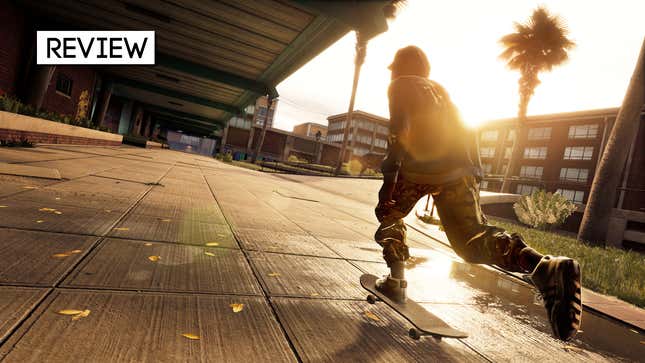
Let’s just get this out of the way: Tony Hawk’s Pro Skater 1+2 is a masterpiece. In perfectly mimicking the iconic skateboarding series’ first two outings, this remaster gives me everything I could ever want out of a game. I am dumbfounded by there somehow being something so good and pure in the world.
I first played Tony Hawk’s Pro Skater, like many did, as a kid frustrated with the complexities of real skateboarding in the early 2000s. After hours of fighting with my terrible body to just do an ollie—please, why is this so hard—it felt nice to boot up a game where the foundational trick could be performed with a single button. I kickflipped over massive halfpipes. I slid along the blades of a helicopter. I marveled at the unlockable Rodney Mullen videos. I sang along to Rage Against the Machine’s “Guerrilla Radio,” music that would have never been allowed in my house otherwise.
As you might imagine, I had high hopes for Tony Hawk’s Pro Skater 1+2—which we’ll call THPS1+2 from now on because that name is way too unwieldy. We haven’t had a good Tony Hawk game for a decade or more, depending on who you ask. Frankly, I haven’t been all that impressed with the series since Tony Hawk’s Underground took up a near-permanent residence in my GameCube in late 2003, and none have reached the impeccable heights of 2000 follow-up Tony Hawk’s Pro Skater 2.
The idea of one of my favorite games of all time getting dolled up for a date with modern consoles was a dream come true. Thankfully, Vicarious Visions nailed it with THPS1+2. Since getting my hands on the excellent Warehouse demo last month, I’ve been in awe of the way the studio almost perfectly replicated the mechanics of the original games. While there’s a detailed tutorial to get newcomers and veterans up to speed, muscle memory took over almost immediately. I had no problem quickly busting out huge combos—well, huge for me—and completing objectives in the full game.
THPS1+2 also features a host of smaller changes that makes it that much better. Mechanics from later games, like manuals, reverts, and spine transfers, have been added to the basics, opening up additional scoring opportunities in levels where they weren’t previously available. New challenges extend the amount of time you spend in each stage. Heck, you can even press in the right control stick to skip the current song if you’re just not feeling it. I also appreciated that the music is consistent, which means that restarting a run to get a trick or challenge down just right won’t result in a hitching, skipping soundtrack.
That said, THPS1+2 is mostly the same game—or games, I guess. The levels, while much prettier this time around, are so close to perfect that I couldn’t pick out any major changes. Secret areas are still unlocked in the same way, such as grinding the helicopter in Tony Hawk’s Pro Skater 2’s Hangar level. I was even able to use decades-old guides when I couldn’t remember where the next letter in S-K-A-T-E or a secret video tape was hidden. It was like returning to a childhood home and being awash in nostalgia, general details eventually giving way to meticulous memories.
There are very few gaming experiences like Tony Hawk’s Pro Skater these days. Skateboarding games have only grown more and more complex. And while there’s certainly a place for projects like Skate and Session, which offer a more realistic take on the extreme sport, they’re never quite as satisfying as the series that started it all. Even with all its changes, THPS1+2 perfectly captures a moment in time. It’s a damaged Polaroid photo scanned, digitized, and lovingly retouched. It’s gravel picked out of a scraped knee. It’s a good night’s rest, untouched by nightmares and insomnia. It is, as it always was, exactly what I need right now.




